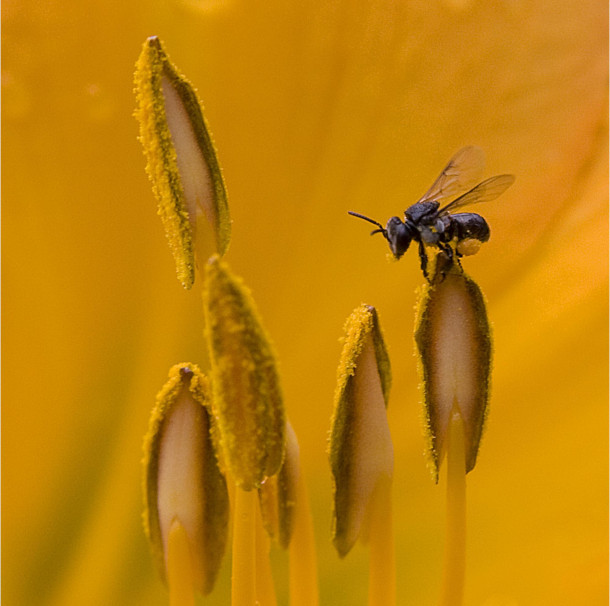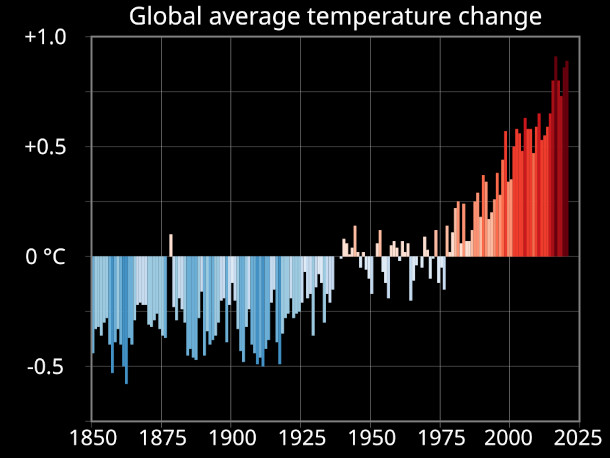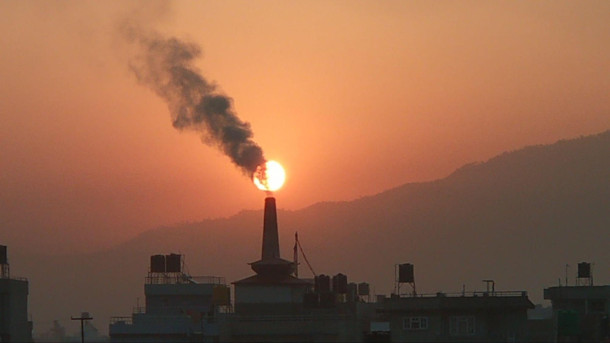Sneezing and Climate Change
Air Date: Week of April 11, 2025

In Brisbane’s Botanic Gardens, a tiny native bee works its way through a flower, harvesting pollen. (Photo:Weldon Thompson, Wikimedia Commons, Public Domain)
Warmer temperatures are causing plants to bloom earlier and longer, leading to longer and more intense pollen sneezing seasons for people susceptible to allergies. Dr. Neelu Tummala is an ear, nose, and throat physician at NYU Langone Health who has written on the impact of climate change on our allergies. She joined Host Aynsley O’Neill to talk about the connection between climate change and allergies.
Transcript
O’NEILL: We are in the middle of sniffling season. In the southeast, the yellow mist of pollen might have peaked already. But for the millions of allergy sufferers in the colder parts of the country, the season of misery will be around for a while. And scientists believe that our warming climate is intensifying seasonal allergies. With warmer weather, plants are blooming earlier, and an increase in atmospheric carbon dioxide levels prods plants to step up pollen production. Altogether, it means that allergy season arrives earlier, ends later, and boasts more pollen throughout. To learn more about the connection between climate change and our itchy eyes and runny noses we are joined by Dr. Neelu Tummala. She is an Ear Nose and Throat physician at NYU Langone Health who has written extensively on the impact of climate change on our allergies. Dr. Tummala, welcome to Living on Earth!
TUMMALA: Thank you. It's great to be here.
O’NEILL: Let's take this year's allergy season and compare it to one from, say, 20 years ago or 50 years ago. What's the difference between allergy seasons now and the allergy seasons of the past?
TUMMALA: The allergy season has changed, and a big reason for that change is that the environment that we are living in on a day-to-day basis, is different now than it was 50 years ago. Because of global warming, temperatures have risen as compared to preindustrial times, and so with those changes in temperatures, there's also been some changes in precipitation patterns, and these environmental changes have affected the pollen allergy season specifically. So, what the data shows is that the pollen allergy season on average in the United States is about three weeks longer now than it was 50 years ago, and so this accounts for both an earlier start to the pollen allergy season. So usually, tree pollen is an issue in the spring, and then in the fall, the pollen is lasting longer, so that's usually ragweed pollen. And the reason for that is when we have warmer temperatures, the ground thaws earlier in the year, so this allows the trees to grow earlier, and then the ground doesn't freeze as quickly in the fall, and so the pollen lasts longer. Another difference we're seeing now, as compared to 50 years ago, is that there's a lot more pollen in the air. So, the data shows that there's about 20% more pollen in the atmosphere in the United States than there was 50 years ago. And this, again, is related to some of the impacts that we're seeing from global warming and increased carbon dioxide, one of the main greenhouse gasses that is warming the planet, and how that impacts the ways that trees and plants grow.

In the last two decades, data has shown continuous spikes in the global average temperature. This has altered the growing season for many pollen-producing plants. (Photo: Sebastian Wallroth, Wikimedia Commons, Public Domain)
O’NEILL: And so, this is happening in both the spring pollen seasons and the fall pollen seasons, and they're both stretching out longer like this. What's the implication for, you know, public health when it comes to having a longer allergy season?
TUMMALA: So, there's a couple of different things that I am really concerned about as a physician who's treating patients who are presenting to me with pollen allergy symptoms. So, the first is, how is this impacting quality of life? So, for anyone who has pollen allergies, it's not fun, and about 20% of Americans have pollen allergies, so this increases the amount of symptoms that patients have to deal with. So, this includes the nasal congestion, the sneezing, the itchy, watery eyes, the runny nose, all of those symptoms are going to be starting earlier and lasting longer. So basically, it's just having to deal with these symptoms that impact our quality of life, impact our sleep efficacy, impact our ability to pay attention during the day for longer throughout the year. The second issue is, when there's more pollen in the air, the symptoms themselves are likely to be more significant, right? So, if you're dealing with more pollen, then that's going to be more of an issue in terms of how much it's irritating and causing inflammation inside the nose and causing worsening symptoms than you used to have. So, in order to control these symptoms, a lot of times, people have to adjust their allergy medications, and so this may include starting your allergy medications earlier in the year and using them longer in the fall, or potentially even increasing the amount of allergy medications that you're using. So, these are going to have a direct impact on your wallet, right? If you're using more medication. You have to pay more for medication to be able to control your symptoms, and so there is definitely concern for the economic impact this is having on anyone with pollen allergies.
O’NEILL: And I mean, I've had seasonal allergies my whole life, but that doesn't actually mean they know that much about them. To what extent are seasonal allergies just some sort of unfortunate annual discomfort, versus something that could be more serious?

Not only does air pollution from fossil fuel burning contribute to asthma and upper respiratory disease, but the global warming that results from carbon emissions can exacerbate environmental allergies, also leading to asthma and upper respiratory complications. (Photo:Janak Bhatta, Wikimedia Commons, Public Domain)
TUMMALA: For some people, pollen allergies are more of a bothersome thing, right? They might have very mild pollen allergies, so they'll feel a little bit of sneezing congestion. It's something they notice, but it may not have a significant impact on their day to day versus there are some people where allergies are much more severe, they have a much stronger reaction to it. And for some people, allergies can trigger asthma attacks. That's called allergenic asthma. And so, it's not just dealing with the nasal symptoms, the itchy, watery eyes, but it can also impact your breathing. And so those are some of the really concerning sequelae of pollen allergies. Is how is it impacting your breathing? How is it impacting upper airway inflammatory diseases, other airway diseases and breathing complications associated with that.
O’NEILL: Beyond your typical over the counter or even prescription allergy medication, what are some tips you would give to pollen sufferers when they're going through these seasonal allergies?
TUMMALA: So, there's a couple of different things that can be helpful when you're thinking about avoiding the impacts of pollen allergies. So, one of the first things is, how do you protect yourself from pollen exposure? And so, one way is to check the pollen levels, and on days where the pollen levels are really high, try to minimize the amount of outdoor exposure that you have, you can also wear a mask when outdoors, because that will definitely help mitigate the amount of pollen that you're exposed to. We also know that right now, we're going through tree pollen. The highest levels tend to be in the morning and the afternoon, so maybe choosing to be outdoors more in the late afternoon or evening, you'll probably be exposed to lower pollen levels. When you come back home from being outdoors, it's really helpful to change your clothes, shower if you're out with your pet, sometimes giving your pet about making sure you get all the pollen out of the fur can be helpful. Keeping your windows closed when you're driving your car, when you're at home, will definitely help prevent pollen from getting in the home. So those are some tactics, just to avoid the pollen exposure itself.
The next level is okay, if you are exposed to these pollen levels, then how do we protect ourselves from them? And that's where, like you said, the allergy medications come into play. And there are both nasal sprays and eye drops and oral allergy medications that you can take. And these definitely deserve a really good discussion with your allergist or ENT physician to talk about what's going to be an ideal regimen for you to control your symptoms. And then the third area that we think about is if these interventions aren't enough, or, you know, if someone just really wants to see what else can be done, that's when allergy immunotherapy can be helpful. And so again, this is a conversation you'd have with your allergist or ENT physician to say, you know, could allergy shots be helpful for me when I'm dealing with my pollen allergy symptoms.
O’NEILL: Beyond a seasonal allergy, you know, these pollen allergies we've been talking about, how is climate change affecting life for allergy sufferers generally?
TUMMALA: So, another way that global warming is impacting anyone who has environmental allergens is its impact on extreme weather events like flooding and hurricanes. So, with global warming, climate scientists have showed that extreme weather events like flooding and hurricanes are definitely more intense, and the frequency of some of these extreme weather events has increased. And so, one of the big concerns is the water that's left after these events, and the increased risk of mold growth and mold exposure. Mold is a really common environmental allergen as well, so anyone who's been in a home that has been flooded or has had to deal with standing water, the mold exposure is definitely something that we also want to be conscientious of, and definitely make sure that we address that both from cleaning the mold standpoint, but also from protecting ourselves from the allergy symptoms associated with it.

Dr. Neelu Tummala is an Ear Nose and Throat physician and assistant professor of Otolaryngology Head and Neck Surgery at NYU Langone Health. (Photo: Neelu Tummala)
O’NEILL: And Dr. Tummala, what do you see as the importance of addressing our changing climate from a healthcare perspective?
TUMMALA: So, addressing our changes in climate is incredibly important from a healthcare perspective. Climate change itself has had a huge impact on public health, both here in the United States and globally, and it is one of those public health concerns that's going to continue to get worse unless we do something about it. And so, you know what we talked a lot about today is, how do patients protect themselves? And so, it is about avoiding the exposure and changing your medications, you know, avoiding being outdoors at certain times. All of that you know, is really important. But what we also need to do is make the environment that we live in a healthy environment. We can't expect to be as healthy as we want to be if we live in an environment that is not healthy. And so, one of the major things that we really need to do is we need to transition off of fossil fuels that are contributing to emissions that are warming the environment. They're contributing to global warming. We need to improve air quality. We need to, you know, make sure that the water that everyone is drinking is clean. And so, all of these things are really essential to making sure that the environment that we're living in is healthy, so that we can all be healthy. And so, at the root of all of this is really addressing the root cause of these health concerns, and that's climate change. And so that's why climate action is so important for improving public health.
O’NEILL: Dr. Neelu Tummala is an ENT physician at NYU Langone Health. Dr. Tummala, thank you so much for taking the time with me today.
TUMMALA: Thank you so much for having me. It was really great to talk about such an important topic, and I appreciate you all covering this.
Links
Learn more about climate change’s impact on allergies
Dr. Tummala’s article on severe allergies and climate change
Living on Earth wants to hear from you!
Living on Earth
62 Calef Highway, Suite 212
Lee, NH 03861
Telephone: 617-287-4121
E-mail: comments@loe.org
Newsletter [Click here]
Donate to Living on Earth!
Living on Earth is an independent media program and relies entirely on contributions from listeners and institutions supporting public service. Please donate now to preserve an independent environmental voice.
NewsletterLiving on Earth offers a weekly delivery of the show's rundown to your mailbox. Sign up for our newsletter today!
 Sailors For The Sea: Be the change you want to sea.
Sailors For The Sea: Be the change you want to sea.
 The Grantham Foundation for the Protection of the Environment: Committed to protecting and improving the health of the global environment.
The Grantham Foundation for the Protection of the Environment: Committed to protecting and improving the health of the global environment.
 Contribute to Living on Earth and receive, as our gift to you, an archival print of one of Mark Seth Lender's extraordinary wildlife photographs. Follow the link to see Mark's current collection of photographs.
Contribute to Living on Earth and receive, as our gift to you, an archival print of one of Mark Seth Lender's extraordinary wildlife photographs. Follow the link to see Mark's current collection of photographs.
 Buy a signed copy of Mark Seth Lender's book Smeagull the Seagull & support Living on Earth
Buy a signed copy of Mark Seth Lender's book Smeagull the Seagull & support Living on Earth

